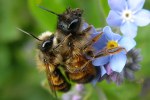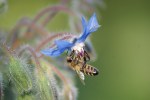News
Bees: small in size, big in effect
"The ideal would be not to feed them at all," says beekeeper Klébert Silvestre from the French community of Les Belleville when interviewed about his black bees. He is committed to the preservation of this old bee species and practises a sustainable form of beekeeping. For example, he leaves his bees honey instead of feeding them sugar. Silvestre is also an expert in CIPRA's bee conservation project BeeAware! and was interviewed for SzeneAlpen. However, the world of bees in the Alpine countries means much more than just a sweet substance to put on our bread, as Monika Gstöhl of CIPRA Liechtenstein writes in her introductory guest article for the themed issue: "Bees and other pollinating insects play a key role in biodiversity, secure our food and generate great monetary value in the process". Why wild bees are just as important for this as honey bees, what endangers them and how the bee has become a cultural symbol on the one hand and a political issue on the other - these are the questions now addressed in CIPRA's current issue of AlpsInsight.







